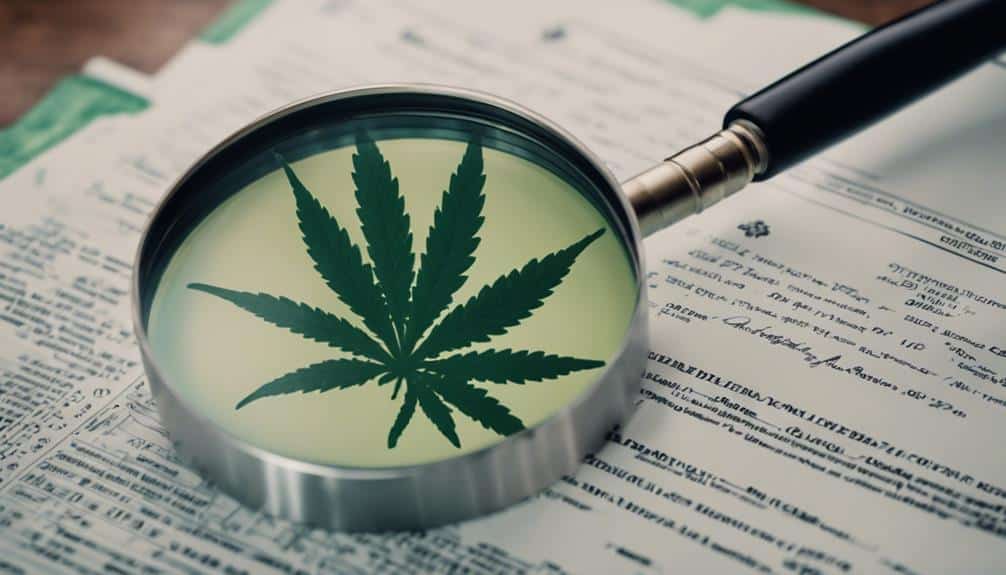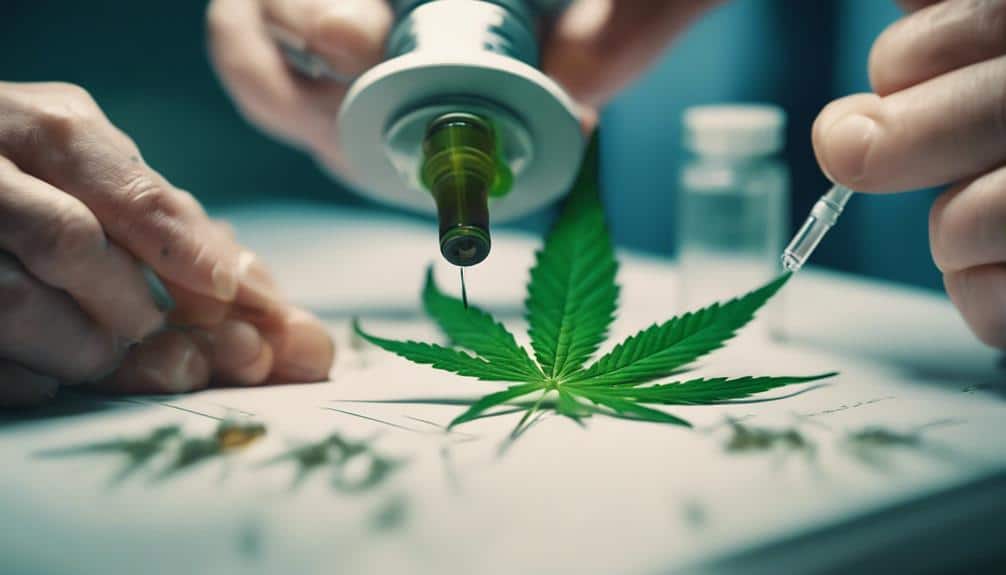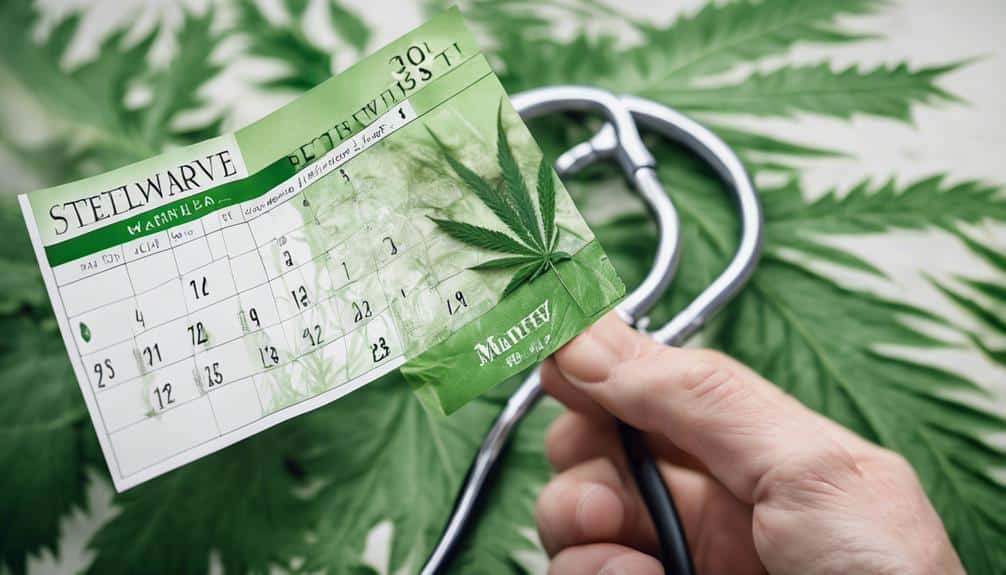Imagine you’re a resident of Delaware with a qualifying health condition, seeking to apply for a medical marijuana card. It’s not as simple as filling out a form and waiting for approval. There’s a meticulous process involving your physician, state laws, and quite some paperwork. But don’t worry; we’re here to break it down for you, making it less daunting. What are these qualifying conditions? How can your physician assist you? Stick around, and we’ll explore these burning questions together.
Table of Contents
Understanding Delaware’s Medical Marijuana Laws

To navigate the labyrinth of Delaware’s medical marijuana laws, you’ll need to grasp several key principles and regulations that govern its use. It’s not just about understanding the legal implications; it’s also about recognizing the program limitations.
Firstly, it’s crucial to understand that while medical marijuana is legal in Delaware, recreational use is not. This distinction carries significant legal implications. If you’re caught using marijuana without a medical card, you could face penalties including fines and even jail time.
Secondly, Delaware’s medical marijuana program has its limitations. The state strictly controls the types, quantities, and distribution of medical marijuana. You can’t grow your own plants; you must purchase them from state-licensed dispensaries. Also, there’s a limit to how much you can possess at any given time.
Moreover, your ability to use medical marijuana in public places or rented properties may be restricted, depending on local rules and regulations. In short, while Delaware’s laws provide a path to legal medical marijuana use, they’re also fraught with restrictions and potential legal pitfalls. Understanding these complexities is essential if you wish to help others navigate this challenging terrain.
Identifying Eligible Medical Conditions
After familiarizing yourself with the legal landscape and restrictions of Delaware’s medical marijuana program, it’s equally important to know which medical conditions qualify for its use. The state of Delaware has a specific list of qualifying conditions, and it’s your responsibility to ensure your condition is included.
- Condition Verification: This involves confirming that your specific condition is one of those recognized by the state. Examples of qualifying conditions include chronic diseases like cancer, HIV/AIDS, and degenerative diseases such as Multiple Sclerosis and Amyotrophic Lateral Sclerosis (ALS).
- Condition Documentation: After verifying that your condition qualifies, you’ll need to gather and provide proper documentation. This could include medical records, doctor’s notes, and any other relevant evidence demonstrating that you have the condition.
- Patient Eligibility: Besides having a qualifying condition and the necessary documentation, you also need to meet other eligibility criteria set by the state. This includes being a Delaware resident and being at least 18 years old.
The Role of Physicians in the Application Process

In the medical marijuana application process, your physician plays a crucial role as they must certify that you have a qualifying condition. This certification process isn’t just a simple tick on a form. It requires comprehensive Physician Training to understand the implications and legalities of prescribing marijuana for medical use.
Your doctor’s role extends beyond mere identification of your condition. They have the responsibility to assess your medical history, current health status, and consider the potential benefits and risks of cannabis treatment for you. This is where the concept of Doctor’s Discretion comes in. Your physician must make an informed decision, with your best interests at heart, about whether medical marijuana is a suitable treatment option for your specific circumstances.
Patient Application Process Explained
Once your physician has made the decision to recommend medical marijuana for your treatment, you’ll need to understand the steps involved in the patient application process. The process in Delaware can be intricate, and knowledge of application pitfalls and documentation requirements can be essential.
- Application Completion: Carefully fill out the application form ensuring all required fields are accurately completed to avoid any application pitfalls. Misleading or missing information can lead to application denial.
- Documentation Submission: This is where your documentation requirements come in. You need to provide your Delaware state ID or driver’s license, proof of residency, and a signed Physician’s Statement form. Make sure all documents are current and legible.
- Payment Submission: You’ll also be required to pay a non-refundable application fee. Check and double-check all payment details to prevent any financial hiccups.
Recognizing potential pitfalls and understanding documentation requirements can make your journey smoother. Keeping these points in mind will better equip you to navigate through the medical marijuana patient application process in Delaware. Remember, your proactivity and preparedness can contribute significantly to a successful application.
Navigating the Caregiver Application

Navigating the caregiver application requires careful attention to detail and thorough preparation, similar to the patient application process. You’ll need to have a keen understanding of caregiver qualifications, which include being at least 21 years old, possessing a valid Delaware ID, and not having a felony conviction. It’s also crucial to understand the legal responsibilities that come with this role.
As a caregiver, you’re tasked with managing the patient’s medical marijuana. This means you’ll need to obtain marijuana from a state-licensed dispensary, transport it safely, and administer it properly to the patient. Additionally, you’re not allowed to use medical marijuana yourself unless you’re also a registered patient.
Lastly, be prepared for a criminal background check. The state wants to ensure that those entrusted with this responsibility are upstanding citizens. So take time reviewing the application; understand qualifications and legal responsibilities; be honest in your answers. This will help ensure smooth sailing through the application process and ultimately allow you to provide vital service for patients in need.
Fees Associated With Applications
After understanding your responsibilities as a caregiver, it’s equally important to be aware of financial aspects specifically fees associated with applications.
Here’s what you should expect:
- Application Costs: The Delaware Medical Marijuana Program charges a non-refundable application fee. This cost covers administrative expenses of reviewing your application. It’s essential to make sure all your documents are in order before submitting to avoid wasting these funds.
- Annual Registration Fee: Once your application is approved, there’s an annual fee you’ll need to pay to maintain your caregiver status. This yearly cost ensures your card remains active and valid.
- Fee Waivers: Delaware does offer some fee waivers or reductions for qualifying low-income applicants. You’ll need to provide evidence of financial status when applying for these waivers.
Renewing Your Medical Marijuana Card

Just as important as obtaining your medical marijuana card is ensuring its renewal, which involves several essential steps. You should be aware of the consequences of card expiration, which can include fines and temporary loss of legal protection for using medical marijuana. This can have detrimental effects on health if you rely on it for medical needs.
To avoid this, it’s essential to file for renewal before the expiration date of your card. The state of Delaware has established specific renewal document requirements to streamline this process. You’ll need to provide a copy of your Delaware state ID or driver’s license proving residency. Medical documentation is also necessary validating continued need for medical marijuana use; this could be anything from doctor’s notes to a signed affidavit from a licensed healthcare provider.
In addition, you’ll need to submit a new passport-sized photo and complete a renewal application similar to your initial application. The renewal fee will also apply. The aim here is to ensure continuous, legal access to medication. By fulfilling these requirements, you’re safeguarding your health and contributing to responsible and compassionate medicinal marijuana program.
Conclusion
Navigating Delaware’s medical marijuana application process can feel like unraveling a complex puzzle. However, with an understanding of the state’s laws, knowledge of eligible medical conditions, and guided support from your physician, the puzzle pieces begin to fit together. Remember that fees and paperwork are stepping stones on your journey rather than barriers. Navigate through the caregiver application; renew your card as needed; keep moving forward – because your health and well-being are worth every step.
If you’re feeling overwhelmed with the process, don’t worry! We’re here to help. Why not swing by Cannabis Docs of Delaware for more information? Or better yet, give us a call at (855) 420-6797. We look forward to assisting you on this journey because after all, your health and well-being are our top priority. We’re just a phone call or visit away!

